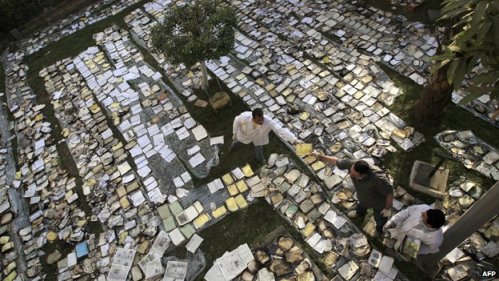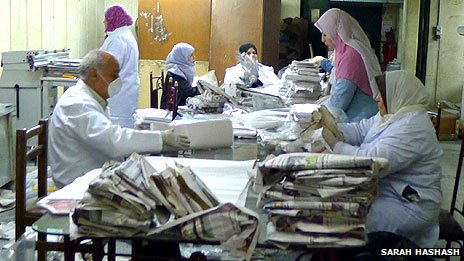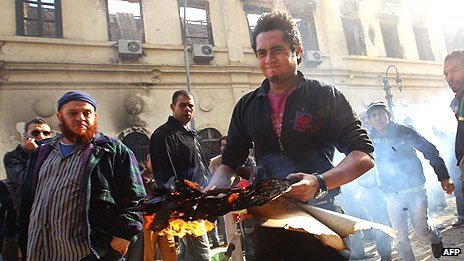"Farewell, my library! Farewell, the house of wisdom, the abode of philosophers, a house and witness for literature! How many sleepless nights I spent there, reading and writing, the night is silent and the people asleep… goodbye, my books!... I know not what has become of you after we left: Were you looted? Burnt? Have you been ceremonially transferred to a private or public library? Did you end up on the shelves of grocery stores with your pages used to wrap onions?"
- Khalil Sakakini, in Cairo, 1948,
from The Jerusalem Quarterly*
Editor's Comment
The fire bombing of the Institut d'Egypte last month reminds us of the destruction of Iraq's National Museum of Antiquities in 2003 while US Marines stood by, protecting the vandals and thieves. The destruction of Egypt's national archives containing 200,000 rare reference books and bound manuscripts dating back to the 1500s is a crime against humanity and one of ineffable significance for us all. UNESCO's Director General, Irina Bokova called it an "irreversible loss to Egypt and to the world."
Haunting: The Pillaging and Destruction of Iraq's National Museum of Antiquities
by Les Blough
Too large a crime to be ignored, the BBC World Service reports on the effort to save as many of the manuscripts as possible, making only one brief reference to the crime itself attributing it to "... clashes between demonstrators and the army in central Cairo in December." But some person(s) committed the crime. The target of the firebombing suggests an intentional rather than random selection. Following the well known approach to criminal investigation - motivation, method & means we ask:
Motivation: Who or what entity hates and envies Egypt, Arabs and Muslims for their place in history, their culture and greatest national treasure?
Method: Who or what entity has committed atrocities like this in the past, executing with impunity the bombings of mosques, market places, and Muslim government buildings and institutions in false-flag operations in Iraq, Pakistan and Syria, et. al.?
Means: Who with motivation and means had access? During the confusion and violence of the ongoing popular revolt against the newly installed regime in Cairo, who was present other than Egyptians who prize their culture and history above all else?
The march toward globalization and the destruction of and hegemony over the Muslim countries of the Middle East, Africa and Asia is intent on erasing national boundaries, histories, cultures and national identities.
- Les Blough, Editor

Restorers laid burnt and damaged books out to dry in the Institute's garden
Thousands of historical documents could be lost following a fire at the Institute of Egypt - which began during clashes in Tahrir Square last month - but an army of restoration workers is working day and night to save the country's written history.
The plain-clothes security guard in the dingy ground-floor office at Egypt's National Archives eyes my camera suspiciously.
On the desk in front of him lies a heavy black revolver. After a brief dispute with my guide and phone calls to his seniors, he reluctantly lets me in.
I am led into an adjoining room where, knee-deep in stacks of newspapers, men and women wearing face masks, rubber gloves and white lab coats are hard at work.
It looks like a cross between a hospital operating theatre and a newspaper printing plant. The smell of singed paper hangs in the air.
From this small room, a vast rescue operation is being mounted to save the ancient books and manuscripts, which were damaged after the country's oldest research institute - the Institut d'Egypte - was firebombed during clashes between demonstrators and the army in central Cairo in December.
Founded by Napoleon Bonaparte in 1798, during the French expedition to Egypt, the institute is one of the oldest academies of arts and sciences outside Europe.
|
Some of the books were still smouldering when we opened them - we had to pour water on them to put out the flames” - Mona Mohamme Abdo Head of bookrestoration |
Indeed it was Napoleon who led the efforts to compile the institute's most prominent work, La Description de l'Egypte, a 23-volume tome dating back to 1809. Describing Egyptian civilisation, nature and contemporary life it was compiled by more than 150 French scholars.
A first edition of the work has been partly damaged in the fire.
The institute held more than 200,000 rare reference books and bound manuscripts dating back to the 1500s, in five languages: Arabic, French, English, German and Russian.
Many are from the 19th Century, the era of the great Victorian explorers of Africa.
Among its collections were handwritten letters, travelogues and tens of thousands of maps, including a 1752 atlas of Upper and Lower Egypt and a German atlas of Egypt and Ethiopia dating back to 1842.
'Tiny bits of history'
Irina Bokova, Unesco's director general, called the fire an "irreversible loss to Egypt and to the world".
The conservation workers at the National Archives wrap copies of books, drenched as the fire was hosed down, in reams of newspaper to soak the moisture from their pages.

Book restorers work at tables Restorers work long hours to try to save books and documents
The packages, like square-shaped bundles of fish and chips, are then sealed in a vacuum pack.
The nearby corridor is lined with heaps of these plastic parcels. Each needs to be opened, checked and repackaged every three days - a painstaking process that will take several weeks, so workers are staying late into the night to finish the job.
Mountains of blackened books and charred paper fill the room.
Everywhere fragments of paper litter the floor - tiny bits of history beyond salvation.
I tiptoe across the room gingerly, all too aware that I am treading on scraps of paper hundreds of years old. It is a sad feeling, like walking over somebody's grave.
In the corner, a worker is layering pages of a large manuscript with sheets of plain paper. The edges of the pages crumble as he lifts them, the fragments settle on the floor where they will gradually disintegrate into dust.
It feels like the un-making of history.
'This is our heritage'
Mona Mohammed Abdo, the head of book restoration at the National Archives, a woman in a blue-green headscarf with twinkling eyes, takes a break from her work to show me around.
"It's a catastrophe," she says. "It's the first time I've worked on anything of this scale. Thirty truckloads of books arrived in the first few days.
"We had nowhere to put them so, at the beginning, to stop them going mouldy, we were forced to resort to natural drying techniques.
"We spread pages across the ground in the garden and on the rooftops of the building to dry. Some of the books were still smouldering when we opened them," she says. "We had to pour water on them to put out the flames."
Many of the workers helping are not specialists but ordinary Egyptians who have volunteered.

The Institute held more than 200,000 precious books and documents
Twenty-four-year-old Bushra, a pharmacist wearing a pale pink headscarf and full-length pastel blue dress, looks up from the papers she is wrapping and smiles at me.
"This is our heritage, our culture. It's really important. I had to come and help. They said it was going to rain soon so we had to move fast to get things out of the archive office's garden."
Just down the road, several weeks on, books still lie beneath the rubble of the institute.
It is right by Tahrir square, where demonstrators opposed to the military council that has ruled Egypt since President Hosni Mubarak's fall, are still camped out making their voices heard.
The continuing protests have hampered rescue efforts and the building itself is said to be in danger of collapsing. The top floor has already caved in.
Many of its books have been lost for ever.
Source: BBC
* From Great Book Robbery’ Seeks to Document Loss of Palestinian Books, then Recover Them
"60,000 Palestinian books were systematically looted by the newly born State of Israel during the 1948 war. The story of the stolen books is not only at the heart of our project but also the launching pad of a much bigger and wider endeavor: We intend on communicating the scope and depth of the Palestinian tragedy through the destruction of Palestinian culture in 1948.
"You can follow the film’s progress on their blog (at the time of the last post, in late September, they were establishing story lines and key themes) and do contact them if you have information or a perspective to share on the great loss of Palestinian books.
"This is a multi-part project, involving both the making of the film as well as a sort of digital “recovery” of the books. El Fassed said in a release:
"We want to build a virtual interactive library for the 60,000 stolen books, find the books’ heirs and mobilize action to open access to these books. They have their own individual histories which make them an indispensable part of the fabric of cultural heritage.
"Gish Amit, at The Jerusalem Quarterly, has a longer piece about the loss of these books. Amit briefly documents the librarians who followed in the wake of soldiers, taking Palestinians’ books, as well as the later (contested) history of those books. She, like the filmmakers, quotes writer Khalil Sakakini, who—when forced to leave his home—left behind grand piano, electric refrigerator, and a clearly beloved collection of books. He later wrote, from Cairo:
"Farewell, my library! Farewell, the house of wisdom, the abode of philosophers, a house and witness for literature! How many sleepless nights I spent there, reading and writing, the night is silent and the people asleep… goodbye, my books!… I know not what has become of you after we left: Were you looted? Burnt? Have you been ceremonially transferred to a private or public library? Did you end up on the shelves of grocery stores with your pages used to wrap onions?
Although Sakakini didn’t live to know it, his daughter Hala apparently discovered his books in the Jewish National an University Library, full of his handwritten notes.
Gish Amit wrote in Ownerless Objects? The story of the books Palestinians "left behind" in 1948: (our quotes in the title)
"We now know what became of that library: Tom Segev, who made Sakakini one of the protagonists of his book on Palestine during the British Mandate, notes in a footnote what he learned from Sakakini’s daughter, Hala, who in the summer of 1967 visited the Jewish National and University Library with her sister and discovered there her father’s books scrawled with his handwritten notes."